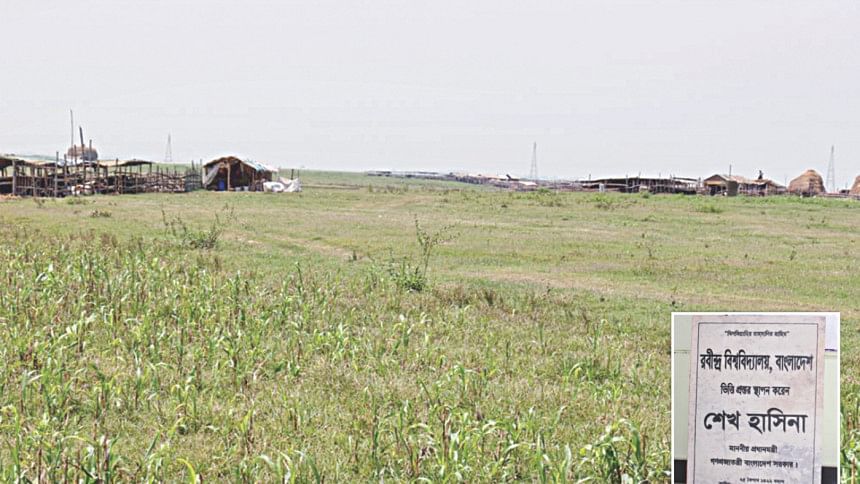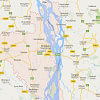The light of education is yet to shine at Rabindra University

When Rabindranath Tagore took his first steps in bringing his education philosophies to life he started small. In 1901, with no more than five enrolled students, he began teaching in the shade of trees in rural Santiniketan. In keeping with his holistic approach he favoured the natural environment as classroom and pupils would spend break time climbing the trees under which they studied. For Tagore, simplicity was a cardinal principle.
More than a century later in Shahzadpur of Sirajganj, where Tagore spent part of his youth looking after his family's landholdings, the establishment of long-awaited Rabrindra University has been anything but simple.
On Tagore's 154th birth anniversary, on 8 March 2015, Prime Minister Sheikh Hasina dedicated the foundation stone for the university. A year later, and the stone is yet to be placed, being stored unceremoniously at an upazila government office.
“To establish a fully-fledged university takes a long time,” says Rajshahi University's former vice-chancellor Dr. Abdul Khaleque who is convenor of the Rabindra University implementation committee. “To complete all necessary tasks quickly is quite impossible.”
“Without an act of parliament no university can run,” says Md Fardous Zaman, an additional director of the University Grants Commission.
He notes that the education minister Nurul Islam Nahid introduced the Rabindra University Bangladesh Bill 2016 to parliament on 8 February. It was subsequently sent to the parliamentary standing committee to prepare a report, which on 26 April recommended the bill's approval. It is hoped the bill may pass in the next session.
“If parliament passes the bill,” says Fardous, “then a vice-chancellor can be appointed.” A proposal for Tk 156 crore in university funding, meanwhile, has been submitted to the executive committee of the National Economic Council.
For a campus, around 100 acres at Rautara in Shahzadpur has been selected, according to local upazila nirbahi officer Shamim Ahmed. “Tagore's family donated 1200 acres to their poor subjects in Shahzadpur to be used for cattle grazing,” he explains, “The area is not in the possession of the land ministry but 100 acres of that land has been earmarked.”
According to Ahmed, the site selection proposal was submitted to the education ministry last week. “The land can be handed over to the university following ministry approval,” he says. “No further action can be taken without the passing of the university's act of parliament.”
“People in this region have waited a long time for the Rabindra University to open,” says renowned Tagore researcher Nasim Uddin Malitha. “It would be ideal if academic activities could begin in the 2016 – 2017 session; only dedicating a foundation stone is not progress.”
Dr Khaleque similarly hopes academic activities can commence with admissions accepted for the next academic year. He suggests Shahzadpur's government college and Kacharibari, the Tagore estate which is now a museum, could be used as a temporary campus.
It would seem that in Tagore's day spreading the light of education was a less bureaucratic endeavour. In 1921 the Nobel laureate invested his prize winnings to establish the college that would become the world renowned Visva-Bharati University.
“The highest education,” Tagore wrote, “is that which does not merely give us information, but makes our life in harmony with all existence.”
Tagore believed in the power of education to bring liberation to humankind. He introduced new ideas including that education should consist of training in all the senses, not only the mind; that learning through activity is more meaningful than book-based study; that culture is far broader than academic knowledge. At Santiniketan he hoped to create an institution that would live up to the motto he chose: “Where the whole world meets in a single nest.”
“I hope the university will be a general one run like Visva-Bharati,” says Dr. Khaleque. With a unique Bengali legacy to draw upon, Rabindra University certainly has the potential to bring new life in Bangladesh, to Tagore's education ideals.
But for now, the powers at be might do as well to recall the insightful Tagore quote, “You can't cross the sea merely by standing and staring at the water.”

 For all latest news, follow The Daily Star's Google News channel.
For all latest news, follow The Daily Star's Google News channel. 








Comments